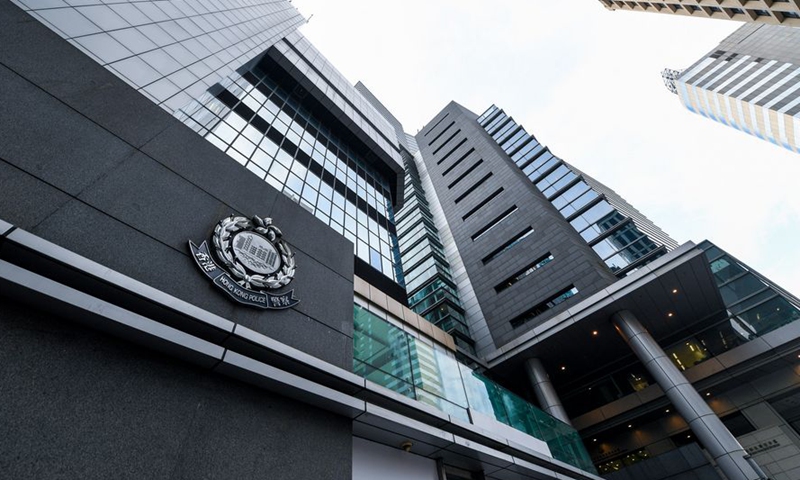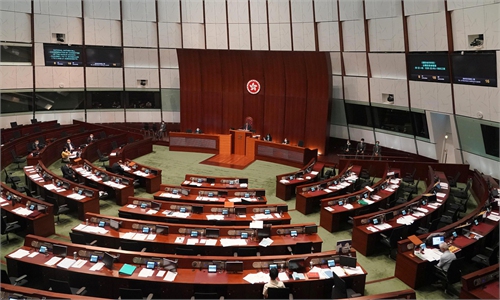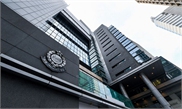
Hong Kong Police Wanchai district headquarters, Aug. 21, 2019 (Xinhua/Mao Siqian)
The Hong Kong Police Force confirmed on Wednesday afternoon that it arrested 53 people on charges of subversion, including six involved in organizing and planning it, in a move which observers said is a legitimate and long-awaited action.
Those arrested included Hong Kong law professor Benny Tai Yiu-ting and anti-government lawmakers and district councilors who took part in the so-called "35-plus" political strategy last year, which was aimed at subverting the political power of Hong Kong authorities, officials and experts said.
The police said in a statement to the Global Times on Wednesday night that the operation was still underway and the possibility that more people will be arrested cannot be ruled out.
The Chinese Foreign Ministry, the central government's liaison office in the Hong Kong Special Administrative Region (HKSAR) and central government's office for safeguarding national security in Hong Kong voiced support for the operation.
The Chinese Foreign Ministry called the operation "necessary and a must," echoing Hong Kong Secretary for Security John Lee Ka-chiu who said those people detained by the police aimed to paralyze the HKSAR government, so the police had to take action.
The liaison office, the central government's office for safeguarding national security in Hong Kong and Hong Kong government all voiced support for the HKPF, praising the Hong Kong authorities for their determination to safeguard national security. The HKSAR government also said any act of subversion can't be tolerated.
The liaison office also stressed support for distinguishing between suspects who have strategically organized or carried out paralyzing the government and people who were generally misled into voting in so-called "primaries." The HKPF also said that Wednesday's operation aimed at those who intended to paralyze the government and won't target those who voted on July 11 and July 12, 2020.
The national security department of the HKPF searched 72 locations to arrest 53 people by mobilizing about 1,000 police officers, Steve Li Kwai-wah, senior superintendent of the department, told a press conference on Wednesday afternoon. Through the investigation, the suspects allegedly granted funds to participants in the illegal primary election, violating the fairness of the election. It also gave orders to four media outlets for accessing the materials involving the transactions, toward which the police hoped to understand the transactions. It also freezed assets of the four media firms worth 1.6 million Hong Kong dollars ($206,400).
They were accused of making an election pledge to veto the government budget, since one suspect arrested proposed a so-called "35-plus" political strategy in March 2020, aiming to force the chief executive to resign and paralyze the government, the Hong Kong police officer said.
When some Western media and politicians including Antony Blinken, Secretary of State nominee for the Biden administration, claimed the arrest was as "an assault" on those advocating for so-called universal rights, observers in Hong Kong and the mainland slammed such interpretation, as the actions did not specifically target any political group, while both the central and local government had mentioned before that the so-called primary election was suspected of subversion. But those who organized it and participated in it ignored the warning, observers said.
"To safeguard the authority of the national security law for Hong Kong and governance of the HKSAR government, and from a perspective of deterrence, authorities must take these actions," Lau Siu-kai, a former adviser to the central government on Hong Kong affairs, told the Global Times on Wednesday.
In addition to Tai, who was a major organizer of the opposition camp's so-called "primary election" by bringing up the idea of the "35-plus" strategy, the police also arrested a number of district lawmakers and some former LegCo lawmakers including Jimmy Sham Tsz-kit, Alvin Yeung Ngok-kiu, Wu Chi-wai, Lam Cheuk-ting, Ventus Lau Wing-hong, Fergus Leung Fong-wai and Leung Kwok-hung, Hong Kong media reports said.
Some pro-establishment lawmakers in Hong Kong also hailed the arrest as the ten steps in the so-called "35 plus" political strategy aim to take control of the LegCo, paralyze the HKSAR government, woo international sanctions on Hong Kong and damage the overall interests of the country, according to a statement Elizabeth Quat, a pro-establishment lawmaker, sent to the Global Times on Wednesday.
Those arrested were all connected to the illegal "primary election" coordinated by the opposition camp in 2020, which has been criticized for damaging the fairness of the LegCo election and has been described by some mainland experts as "an attempt to usurp" the power of Hong Kong politics that would have severely damaged national security.
Legal experts saw the arrest as a legitimate and long-awaited action in line with local law and the National Security Law for Hong Kong, which has nothing to do with any so-called "political crackdown," as the illegal primaries organized by anti-government groups were seen as part of their ill-intentioned plan to manipulate election results, subvert state power, and collude with external forces to completely usurp the power of the authorities.
"Local authorities enforce the law rigorously, underscoring the deterrent effect of the National Security Law for Hong Kong and determination of the rule of law," Tian Feilong, an associate professor at Beihang University in Beijing and member of the Beijing-based Chinese Association of Hong Kong and Macao Studies, told the Global Times on Wednesday.
"With sufficient evidence and assessment, law enforcers are fulfilling their legal responsibilities under the National Security Law for Hong Kong. The arrest is part of an investigation. Whether those arrested will be prosecuted and convicted is up to the Department of Justice in line with the national security law," Tian said.
As the cases are relevant to national security, the central government's office for safeguarding national security in Hong Kong has the right to supervise and guide the cases in accordance with the National Security Law for Hong Kong to jointly maintain law and order as well as the system's authority, he added.
The investigation and prosecution of the offense of subversion won't hinder authorities to hold those violating local elections regulations accountable, and relevant violations of local regulations in Hong Kong would be handled as ordinary criminal cases.
Tai was also one of the founders of the illegal "Occupy Central" movement in 2014 and sentenced to 16 months in prison. The opposition camp also demonized the national security law for Hong Kong, claiming that it threatens the "primaries," which were criticized by the central government's liaison office in Hong Kong last year, saying that such political activities are suspected of violating the national security law for Hong Kong and the local election rules.
"The enforcement of the law also demonstrates that Hong Kong authorities have unshakeable determination to safeguard national security, which won't change when the case involves some 'high-profile' or 'star-like' anti-government political figures," Lawrence Tang Fei, a member of the Chinese Association of Hong Kong and Macao Studies, told the Global Times on Wednesday.
More importantly, as the charge is relevant to subversion under the national security law for Hong Kong, which is a serious accusation, the police would not have taken action if they did not have strong evidence, Tang said.
The operation would also help clarify the criteria for taking part in the political life in Hong Kong under the national security law for Hong Kong, which would only tolerate "honest opposition groups," Lau said.



